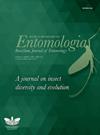Occurrence of Heilipus draco (Coleoptera: Curculionidae) in seeds of Ocotea puberula (Lauraceae) and its influence on germination
IF 0.7
4区 农林科学
Q4 ENTOMOLOGY
引用次数: 0
Abstract
ABSTRACT This study aims to report the occurrence of Heilipus draco in seeds of Ocotea puberula, and to describe the main injuries caused to the seeds and the effects on germination, as well as the occurrence of parasitoid hymenopterans. To this end, fruits of seven trees were selected, in the extreme south of the Atlantic Forest, Brazil. Fruit collection was carried out weekly in the middle third of the canopy, forming lots, from the beginning of fruit formation until total dehiscence, for two years. In order to examine the damage caused by the granivorous insects inside the fruits, 100 fruits were sectioned taking into account the batch/year with the aid of a scalpel and analyzed using a binocular stereomicroscope. In the same way, 144 fruits from each lot/year were stored individually in transparent plates in order to verify the occurrence and identification of species of granivorous insects. The proof of the influence of the injury caused to the seeds by the granivorous insects was carried out by the germination test, with four replications of 25 seeds, comparing seeds with and without oviposition holes. The species H. draco was found to be associated with the fruits of O. puberula. The egg-layings are endophytic, carried out directly on the seed. Larval parasitism of Hymenoptera Bracon, Omeganastatus, Scambus and Triapsis was observed. It is concluded that the cycle from egg to adult takes place inside the seed of O. puberula, and the injuries caused by the larvae decrease germination.微柔毛桃(樟科)种子中黑蛾的发生及其对萌发的影响
摘要本研究报道了龙黑茧蜂在青春期石茶种子中的发生情况,描述了其对种子的主要危害及其对萌发的影响,以及膜翅目寄生蜂的发生情况。为此,在巴西大西洋森林的最南端,选择了七棵树的果实。从果实形成开始到完全开裂,每周在冠层中间的三分之一处进行果实采集,形成批次,为期两年。为了检验果实内食性昆虫对果实的危害,用手术刀对100个果实按批次/年进行切片,并用双目立体显微镜对其进行分析。以同样的方式,每批/年的144个水果单独储存在透明盘子中,以核实食性昆虫的发生和种类鉴定。通过萌发试验,对25粒种子进行4次重复,比较有卵孔和无卵孔的种子,证明了食蚁兽对种子伤害的影响。发现了与微柔毛瓢虫的果实有关的种。产蛋是内生的,直接在种子上进行。观察了膜翅目小蜂、大翅目小蜂、小翅目小蜂和小翅目小蜂的幼虫寄生情况。综上所述,从卵到成虫的循环发生在微柔草种子内,幼虫对其造成的伤害降低了萌发率。
本文章由计算机程序翻译,如有差异,请以英文原文为准。
求助全文
约1分钟内获得全文
求助全文
来源期刊
CiteScore
1.50
自引率
12.50%
发文量
14
审稿时长
6-12 weeks
期刊介绍:
Information not localized

 求助内容:
求助内容: 应助结果提醒方式:
应助结果提醒方式:


